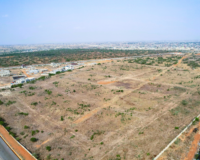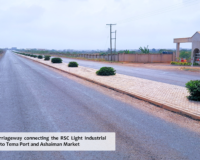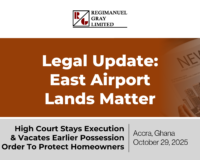How to Buy a House in Ghana from abroad
Navigating Ghana’s Property Laws: A Diaspora Buyer’s Legal & Documentation Guide
Buying land or a house in Ghana from abroad can be a dream, but without strict legal checks it can turn into a nightmare. Common scams (like double sales, fake site plans or forged deeds) and complex tenure rules mean due diligence is crucial. Ghana’s government itself warns that land insecurity is a top concern for overseas Ghanaians. As Ghana’s past Finance Minister, Ken Ofori-Atta, noted that the country is committed to “ensuring Land Security” for diaspora investors and the Lands Commission urges buyers to follow all procedures and verify every document. In practice, confusion over titles or missing paperwork is a leading cause of lost investments. To avoid these pitfalls, every diaspora buyer should demand formal titles and trusted legal guidance.
Understanding Ghana’s Land Tenure
Ghana’s land system has several layers. Broadly, there are four types of land: government (state-owned), vested (formerly public), customary/stool (owned by chiefs or families under customary law), and private/family land. Crucially, the 1992 Constitution (Article 266) forbids foreigners from acquiring freehold land outright. Non-citizens (including diaspora without Ghanaian citizenship) may only hold land under a lease, and even that is capped at 50 years (with renewal possible). In other words, if you’re not a Ghanaian citizen, the longest single lease you can register is 50 years, anything longer must be structured as consecutive leases. By law, any “deed or conveyance” trying to give a foreigner freehold rights is null and void.
By contrast, a Ghanaian citizen (including dual nationals) can hold customary or freehold title normally, but proof of good title is still essential. Many local families have only an oral or customary claim, not a registered deed. That’s why careful title search is key. For example, state or vested land (land acquired by government) can be leased to foreigners up to 50 years. Customary/stool land is in the hands of chiefs/traditional authorities, who can lease land to outsiders (typically also up to 50 years), but only after all required approvals. In fact, Ghana’s Constitution (Article 267) says no sale or development of stool land is valid unless the Regional Lands Commission certifies it was done with proper consent (e.g. District Assembly and stool approval). In practice, this means any contract involving stool land should come with Lands Commission paperwork showing the transaction was vetted.
Key takeaway: As a diaspora buyer, recognize that you’ll likely be signing a lease or leasehold assignment (not outright freehold) for up to 50 years. Make sure your lawyer checks the land’s category (stool, state, private) and that the necessary consents are on file. If you are a Ghanaian citizen, you have more flexibility, but you should still insist on formal title documentation.
Why Legal Clarity Matters – Common Pitfalls & Fraud
Mistakes on the paperwork can be disastrous. Some typical traps include: double sales (same plot sold to multiple buyers), fake or altered documents (forged signatures or site plans), unresolved family disputes over land and even “land guards” extorting new owners. One developer guide bluntly warns buyers to always insist on titled land, because untitled plots often end up in court. Diaspora investors have lost life-savings by paying for land that wasn’t really theirs. According to Ghana’s Lands Commission, one of the biggest challenges for overseas buyers is latent land litigation and encroachment, often due to sloppy or fraudulent sales.
The statistics are alarming: numerous scams involving diaspora buyers have been reported, and officials caution that acquiring land “requires careful planning” to avoid trouble. In fact, at a recent Ghana-UK diaspora conference, Lands Commission officials emphasized that all steps must be transparent and above-board to prevent disputes. The message is clear: if the legal side isn’t airtight, you risk losing your investment. This is where working with a reputable developer or legal team pays off. For example, in its project marketing Regimanuel Gray underscores that it “provides the right legal documentation” for every plot, reflecting its focus on protecting buyers.
Fraud prevention tips: Always verify the title at the Lands Commission, demand an official survey plan with coordinates (to confirm boundaries), and never wire money before seeing proof of ownership. Use a lawyer who will check for caveats or caveats that might be lodged on the land. Remember, Ghana uses a “first to register” rule: if a seller claims they sold land, only a registered deed or certificate at the Lands Commission can conclusively prove it. As one property guide advises, ask bluntly, “is this land already titled in your name?” – and insist on written proof.
Step-by-Step Documentation: What You Need
Successful land purchase boils down to documents, documents, documents. Here is a quick roadmap of the paper trail you should obtain (ideally before wiring any funds):
- Approved Survey Plan: Every plot in Ghana must be surveyed. Hire a licensed surveyor to map the parcel and submit the plan to the Lands Commission’s Survey & Mapping Division. You should get an official plan (with GPS coordinates) stamped by the Surveyor-General. Ask for it! It’s your insurance against boundary disputes.
- Title Documents: If the land is already registered under Ghana’s Land Title system, obtain a Certificate of Title or a certified true copy of it from the Lands Commission. If it’s under the Deeds Registry (customary or undeveloped land), get the original Deed to Land. Your lawyer should review this and confirm the seller’s name matches, and that all stamp duties/fees are paid. If you are buying from a Developer chances are that you may not be able to have this document as it may cover a much larger parcel (like in thousands of acres) in that situation you can perform a title search or certificate search at the Lands Commission (this is now possible online) to ensure that the land is rightfully owned by the seller.
- Sale/Lease Agreement: Sign a detailed written agreement. It should include buyer and seller details, purchase price, payment schedule, completion date and what happens if either side defaults. If the seller is a Developer, they may provide an Agreement to Lease (if state land) or Agreement to Sale (if private land) or a Sale & Purchase Agreement if it is a house. Some developers also issue a Declaration of Trust document, effectively a promise that the seller holds title on your behalf until the sale is completed. Keep copies of these. Ensure the agreement says the sale is subject to Land Commission registration and government consents.
- Declaration of Trust / Power of Attorney: A Declaration of Trust (or escrow instrument) is often used: it declares that the seller (or trustee) will transfer the title to you once conditions are met. Though not strictly required by law, it’s a powerful safeguard if used properly. Also, if you can’t be in Ghana for the closing, arrange a Power of Attorney (PoA). Have it notarized (and apostilled) in Ghana so your lawyer can sign final documents for you. The Lands Commission explicitly requires any agent to present a PoA when acting on an owner’s behalf.
- Government Consents: For customary (stool/family) land, ensure you have official evidence that the transaction was approved. By law, a letter or certificate from the Lands Commission (showing District Assembly and stool consent) should exist. For vested/government land, check that the relevant agency (e.g. VRA, Forestry, etc.) has approved any lease. Without these, registration will be blocked.
- Clearance Certificates and Receipts: Confirm that property taxes, ground rent and any mortgages on the land have been cleared. Your lawyer should check for existing encumbrances and ask the seller to provide receipts showing all dues are paid.
- Identification and Residency Proof: The seller (or developer) should present a copy of their Ghanaian ID or passport. You may also need to register with the Ghana Investment Promotion Centre (GIPC) for buying property, especially if it’s an investment. This proof of ID does not apply to Developers who are already a registered business entity in Ghana.
Before Wiring Funds: Use a checklist (we suggest items above) to tick off each document. Have your lawyer or a trusted person in Ghana verify the originals in person if possible. Never pay the balance until the title has been registered in your name or in trust. Ask your lawyer for receipts of all payments and watch for unauthorized “land guard” payments or unofficial middlemen.
Working with Lawyers & the Lands Commission
If you are buying a house or parcel of land from an individual and not a Developer the key to peace of mind is professional help; therwise buy from a trusted Developer like Regimanuel Gray Ltd. For those buying from individuals, always hire a Ghanaian lawyer who is a member of the Ghana Bar, experienced in real estate. A good attorney will search the title directly at the Lands Commission, prepare and lodge all necessary deeds, and follow up on the registration process. They can also confirm that the seller or Developer is licensed (per Ghana’s Real Estate Agency Act 2020) to sell land. When vetting a lawyer, check references or associations (some firms are well-known for property law).
Keep the Lands Commission in the loop: use their digital services wherever possible. The Lands Commission now allows online searches and even preliminary registration of deeds, making it easier for remote buyers to track their application. At diaspora events, Commission officials have urged buyers to engage directly with their local Lands Commission to authenticate documents. For example, you can request a certificate of title search or lodge a caveat to prevent further deals on a plot.
Also consider leveraging Ghana’s diaspora resources: the GIPC diaspora desk and investor forums often share guidance on land purchase. They reinforce that everything must be documented and registered (no handshake deals).
Choose Your Seller Wisely
Finally, choose your seller wisely. Buying from an established developer can reduce risk. Regimanuel Gray Limited, for instance, is a 30-year-old Developer that markets its in-house legal team as a core strength. Regimanuel Gray invests in land decades ahead of building, ensuring titles are cleared first. As a result, their gated estates (e.g. Regimanuel Satellite City,, East Airport Estates) come with certified titles and site plans already prepared. In Regimanuel Gray communities, purchasers have enjoyed decades of dispute-free ownership. (For details on our process, see Regimanuel Gray’s [Overview] page or [Land for Sale] section for examples of how we document every sale.) In contrast, many newer developers lack such legal depth, and buying raw land “on your own” carries much higher risk of future litigation.
Key partners: Let your lawyer liaise with the Lands Commission’s Land Registration and Mapping divisions. They are your allies. Don’t sign anything if your legal advisor raises a red flag. Remember: as the Lands Commission puts it, Ghana is actively digitizing land records to benefit diasporans, so use those modern tools and professionals who know them.
Checklist Before You Wire Funds
Finally, here’s a quick checklist of documents and steps every diaspora buyer should complete before making any final payment:
- Certified survey/site plan (approved by Surveyor-General).
- Current title documents: Certificate of Title or Deed to Land (plus any certified copies/TCs from Lands Commission).
- Land Title Search Report from Lands Commission (showing no caveats or disputes).
- Executed sale/purchase or lease agreements (signed by all parties) and proof of purchase price payment (receipts).
- Declaration of Trust (if the seller agrees to it).
- Power of Attorney (notarized) for your agent in Ghana.
- Copies of seller’s IDs and chain-of-title documents (with proper stamps).
- Copies of consents (stool/assembly or government letters) for the sale.
- Local legal counsel engaged, with engagement letter on file.
- Proof of identity/residency (your Ghana passport or foreign passport and work details).
- A clear payment plan or escrow arrangement (preferably through attorney or developer).
Think of wiring money as the last step, only after every item above is checked. As one insider guide advises: “Check title at LC. Ask for the site plan. Work with a trusted lawyer. Visit the land. Then ask the seller: is this land titled in your name?”. Only once you have ticked off all confirmations, and ideally have your lawyer hold the proceeds in escrow, should you transfer the final payment.
With proper preparation and the right team (especially a strong legal partner), diaspora buyers can navigate Ghana’s land laws successfully. You can also make it much easier if you buy from a trusted Developer like Regimanuel Gray Ltd. In our gated communities at Regimanuel Gray, owners enjoy decades of secure ownership precisely because all these legal boxes were checked in advance. Follow the roadmap above and make sure every document is in order and you’ll greatly increase your chances of a safe, profitable investment.
——————————————–
References
Ghana Lands Commission, 2021. Diaspora Land Transactions Guidance. Accra: Ghana Lands Commission. Available at: https://www.lc.gov.gh/diaspora-guidance
Ghana Lands Commission, 2021. Categories of Land in Ghana: State, Vested, Customary & Private. Accra: Ghana Lands Commission. Available at: https://www.lc.gov.gh/land-categories
Ghana Lands Commission, 2021. Online Title Searches and Preliminary Registrations. Accra: Ghana Lands Commission. Available at: https://www.lc.gov.gh/online-services
Ghana Lands Commission Survey & Mapping Division, 2021. Survey Plan Requirements and GPS‑Referenced Site Plans. Accra: Ghana Lands Commission. Available at: https://www.lc.gov.gh/survey-mapping
Ofori‑Atta, K.O., 2024. Remarks at the Ghana‑UK Diaspora Conference, Accra, 15 June. Accra: Ministry of Finance, Republic of Ghana. Available at: https://www.mofep.gov.gh/news/diaspora-conference‑2024
Republic of Ghana, 1992. Constitution of the Republic of Ghana. Accra: Government Printer. Available at: https://www.constitution.gov.gh [Accessed 27 July 2025].
Republic of Ghana, 2020. Land Act, Act 1036. Accra: Government Printer. Available at: https://www.lawyard.gh/acts/land-act-2020-act-1036
Regimanuel Gray Ltd, 2025. Internal Company Data & Experience: Litigation‑Free Estate Development. Unpublished internal report, Regimanuel Gray Ltd., Accra.
Regimanuel Gray (RGL) is an established real estate developer in Ghana and a member of the RG Group. RG Group has subsidiaries including Regimauel Concrete Products Ltd (RCP), Bessblock Concrete Products Ltd (BCPL), Sierrablock Concrete Products Ltd (SCPL) and Desjoyaux Ghana Ltd (DGL) a swimming pool construction company.












